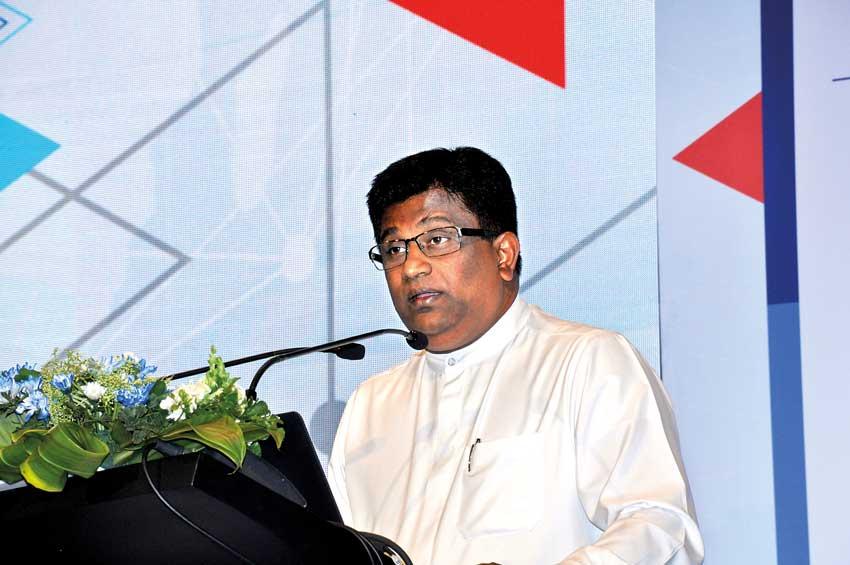19 Mar 2019 - {{hitsCtrl.values.hits}}

Ajith P. Perera
Pic by Waruna Wanniarachchi
By Nishel Fernando
The government will begin the implementation of key programmes and formulating the required legislative reforms within the next three months to support the digitalisation of the Sri Lankan economy.
Digital Infrastructure and Information Technology Non-Cabinet Minister Ajith P. Perera said drafting the Data Protection Bill and Cybersecurity Bill has reached the final stages and expressed confidence that they would be passed in Parliament within three months.
“We have started to draft the Data Protection Bill and Cybersecurity Bill. In the coming weeks, we will share the draft laws with all relevant stakeholders to get the feedback.
Once we all can agree, the bills will be passed in Parliament. I am a man of action. I don’t give more than three months for the whole process,” he said.
He made these remarks at the recently concluded National CxO Forum 2019, in Colombo, organised by the Federation of Information Technology Industry Sri Lanka.
Perera expects that an advanced and updated cybersecurity framework would enhance Sri Lanka’s value proposition as a preferred destination for IT-enabled services.
In addition, he noted that this move would also enhance Sri Lanka’s ranking in the World Bank’s Ease of Doing Business Index.
On the e-government front, Perera was expected to have signed the gazette notification last Friday to set up Sri Lanka’s ‘Population Registry’, which he termed as the “mother of all databases”.
“This will have the information of the entire population at databases centrally built and administered for all government ministries and departments to share data. It will end the isolated information used by different government bodies. Once it’s completed, all government systems will be interoperable. In addition, at departmental level, we have multiple programmes to digitally reform the processes,”
he explained.
Under the programme, all Sri Lankans are expected to receive a new and unique identification number, which will appear in all key documents issued by the government such as birth certificate, death certificate and marriage certificate.
Meanwhile, the Digital Infrastructure and Information Technology Ministry a couple of weeks ago secured the Cabinet approval to finally launch the delayed Digital Economy Strategy for Sri Lanka, which was originally scheduled to be launched last year.
“In order to accelerate the economic growth based on the digital technology, this strategy includes a three-part framework with digitisation of priority sectors in the economy, accelerating growth and improvement of digital sectors and building the required digital infrastructure,”
Perera said.
Under the strategy, three flagship programmes of digitally-enabled export promotion zones and logistic villages, a centralized agriculture nerve centre and a data exchange platform are expected to be implemented.
Further commenting on the implementation of the strategy, Perera said that the government has identified 10 priority projects, which are to be implemented within two months and to be completed in three years.
McKinsey & Company last year stated that the proposed Digital Economy for Sri Lanka could uplift Sri Lanka’s GDP by one to three percent in 2019.
The strategy was designed in collaboration with the international-level consultants and the representatives of the relevant state institutions.
It will be implemented by several indentified government agencies while the coordination work will be carried out by the Digital Infrastructure and Information Technology Ministry.
“Our objective is, with these technologies used in the right manner, to let people in Sri Lanka enjoy the life standard of a developed world citizen in a country with US $ 4,000 per capita GDP, by the optimal use of the right mix of technology, economic and legal frameworks,” Perera said.
15 Nov 2024 52 minute ago
15 Nov 2024 2 hours ago
15 Nov 2024 3 hours ago
15 Nov 2024 3 hours ago
15 Nov 2024 3 hours ago